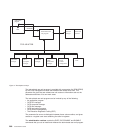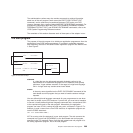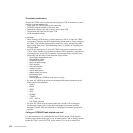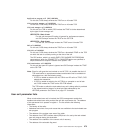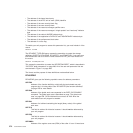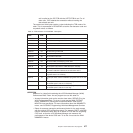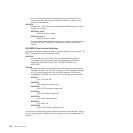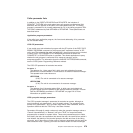UEPRMQUA
Address of an 8-byte field into which the task-related user exit can move
the qualifier name of the resource manager on each API request. This is
useful where the same exit program is used to connect to more than one
instance of a resource manager; the qualifier identifies the instance of the
resource manager to which the exit is currently connected.
Where different resource manager qualifiers are returned on the responses
to various API requests within a UOW, it is the resource manager qualifier
returned on the final API request immediately before a prepare or backout
invocation that is used when recording any in-doubt information.
UEPCALAM
Address of caller's AMODE indication byte.
X'80' Indicates that the original caller was in AMODE 31. If the top bit is
not set, then the caller was in AMODE 24.
UEPSYNCA
Address of the single-update and read-only indication byte. This field
contains flags that your exit program can set to indicate that the resource
manager “understands” the single-update protocol, and to record the status
of the current unit of work (UOW). See “Increasing efficiency –
single-update and read-only protocols” on page 294.
UEPSUPDR (X'80')
The resource manager understands the single-update protocol. That
is, your exit program can instruct the resource manager to perform
a single-phase commit, in appropriate circumstances.
UEPREADO (X'40')
The resource manager understands the read-only protocol, and has
been in read-only mode for this UOW so far. (If this flag is not set, it
means either that the UOW contains updates for this resource
manager, or that the UOW may be read-only but the resource
manager does not understand the read-only protocol.)
UEPTIND
Address of a 3-byte field containing indicators.
The first indicator byte can take one of three symbolic values, UEPTANY,
UEPTCICS, and UEPTUTCB, which you can test to determine: whether
data locations can be above or below 16MB; whether the application's
storage is in CICS-key or user-key storage; and whether the TRUE has
been called by an unexpected TCB:
UEPTANY (X'80')
The application can accept addresses above 16MB. If the symbolic
value is not UEPTANY, the application must be returned an address
below 16MB.
UEPTCICS (X'40')
The application's working storage and task life-time storage are in
CICS-key storage (TASKDATAKEY=CICS). If the symbolic value is
not UEPTCICS, the application's working storage and the task's
life-time storage are in user-key storage (TASKDATAKEY=USER).
UEPTUTCB (X'20')
Indicates an unexpected TCB. Set on a syncpoint or end-of-task
call only, this indicates a failure to switch to the TCB expected by
the task-related user exit. In these two cases, the task-related user
276 Customization Guide



